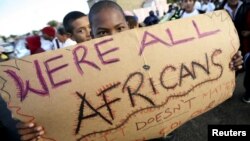As Zimbabwe joins the rest of Africa today in commemorating Africa Day, some local people say most African countries still face serious socio-economic problems that need to be resolved before they even think about unifying the whole continent.
Some even question the ability of the current chairperson of African Union and Southern African Development Community, President Robert Mugabe, in uniting Africans as his nation is ravaged by some serious challenges.
With an array of diverse natural resources found across its length and breadth, Africa is arguably the world's richest continent. But due to a variety of reasons, including natural disasters and violent conflicts, some nationals of a number of African countries are counted among the world's poorest.
As the continent marks Africa Day, a day to remember and reflect on the founding in 1963 of the Organisation of African Unity - now the African Union - some Zimbabweans wonder if African unity can ever be a reality.
Others question African countries’ ability to free themselves from the images of disease, war, hunger and poverty that are often associated with them.
Speaking in Bulawayo in a series of discussions hosted by a non-governmental organization, Bulawayo Agenda, to observe Africa Day, the leader of a certain faction of the Movement for Democratic Change, Welshman Ncube, said despite a chequered history that includes slavery, colonialism as well as post-independence maladministration, Africans have to remain hopeful about the future as not doing so would be equal to giving up on themselves.
ESSENCE OF DEMOCRACY
Ncube said Africa's problems are mainly political as they are centred on a failure to appreciate the essence of democracy. But he was confident that these problems would end one day.
An academic, Dion Nkomo, a lecturer at Rhodes University in South Africa, who also participated in the same discussion, argued that it is difficult for some people to be optimistic about Africa's future as its problems have been persisting inspite of many global interventions to stop them.
Some observers and pan-Africanist pundits also say because of President Mugabe's well-known pan-Africanist ideals, he will be able to make significant strides towards the unification of Africa.
But director Mmeli Dube of Bulawayo Agenda does not share the same view. Dube thinks that Mr. Mugabe's age and his tainted human rights record do not show that he will be able to unite Africans before handing over the A-U and S-A-D-C chair to another president.
In an informal survey in Zimbabwe’s second largest city, Bulawayo, a local resident, who only identified herself as Sheila, said she believes in the ideal of African unity, but noted that she also remains worried about the violent conflicts that occur on the continent as they affect women and children the most.
Sheila said although there are commendable efforts being made to achieve gender parity in many African countries, African leaders can help pay homage to Africa's founding fathers by uplifting their citizens, particularly women and girls.
Taxi driver, Martin Gumbo, who celebrated Africa Day while at work, told Studio 7 that the idea of an Africa that is unified economically and politically is a noble one as this could help ordinary people like him in security their future.
Gumbo said a united Africa would result in stronger economies as well as help bring about political stability across the continent.
XENOPHOBIA
He said Africans should learn from the closely-knit European Union bloc of nations and remember that they are the same people, a view shared by a vendor, who only identified herself as Mrs. Chiwaya.
Chiwaya made reference to the xenophobic attacks in South Africa and said in order for African unity to be achieved, continental leaders must lead by example and pursue unity within their countries as well as across the continent.
“If our leaders show that they are united, there's no way in which us the ordinary citizens can go against this and continue to single each other out saying 'this one is a Zimbabwean and this one is a South African.' Once there is such unity, our leaders can then remove the requirement for visas to visit countries within Africa; this will make it easier for us to travel to other African countries to trade or buy various goods that may not be available in our own country,” said Chiwaya.
Some observers and human rights defenders say despite President Mugabe's assumption of the AU and SADC chairmanship, Zimbabwe remains one of the countries in which the rights of citizens are violated as a result of a lack of respect for rule of law.
ZIMBABWEAN YOUTH
With a an estimated 65 percent of Africa's population being youths below the age of 35, some say Africa's future lies in its youths.
Twenty nine year-old Regis Munyoro, a Bulawayo youth, agrees, noting that youths must play an active role in helping shape Africa's future.
Africa Day gives Africans an opportunity to reconnect and recommit themselves in supporting activities that are designed to develop a strong continent and better world. Some of the continent’s founding fathers, who fought against white colonial domination, envisaged the creation of a United Nations of Africa, a far-away dream now judging from a wide range of issues faced by the African continent.





